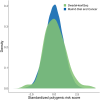Whole genome sequencing in early onset advanced heart failure
- PMID: 39910139
- PMCID: PMC11799378
- DOI: 10.1038/s41598-025-88465-8
Whole genome sequencing in early onset advanced heart failure
Abstract
The genetic contributions to early onset heart failure (HF) are incompletely understood. Genetic testing in advanced HF patients undergoing heart transplantation (HTx) may yield clinical benefits, but data is limited. We performed deep-coverage whole genome sequencing (WGS) in 102 Swedish HTx recipients. Gene lists were compiled through a systematic literature review. Variants were prioritized for pathogenicity and classified manually. We also compared polygenic HF risk scores to a population-based cohort. We found a pathogenic (LP/P) variant in 34 individuals (34%). Testing yield was highest in hypertrophic (63% LP/P carriers), dilated (40%) and arrhythmogenic right ventricular (33%) cardiomyopathy and lower in ischemic cardiomyopathy (10%). A family history was more common in LP/P variant carriers than in non-carriers but was present in less than half of carriers (44% vs 13%, P < 0.001), whereas age was similar. Polygenic risk scores were similar in HTx recipients and the population cohort. In conclusion, we observed a high prevalence of pathogenic cardiomyopathy gene variants in individuals with early-onset advanced HF, which could not accurately be ruled out by family history and age. In contrast, we did not observe higher polygenic risk scores in early onset advanced HF cases than in the general population.
Keywords: Cardiomyopathies; Genetics; Genomics; Heart failure; Heart transplantation.
© 2025. The Author(s).
Conflict of interest statement
Declarations. Competing interests: R.T.L reports research grants from Pfizer and consultancy fees from FITFILE and HealthLumen, unrelated to the present work. P.N. reports research grants from Allelica, Amgen, Apple, Boston Scientific, Genentech / Roche, and Novartis, personal fees from Allelica, Apple, AstraZeneca, Blackstone Life Sciences, Creative Education Concepts, CRISPR Therapeutics, Eli Lilly & Co, Foresite Labs, Genentech / Roche, GV, HeartFlow, Magnet Biomedicine, Merck, and Novartis, scientific advisory board membership of Esperion Therapeutics, Preciseli, and TenSixteen Bio, scientific co-founder of TenSixteen Bio, equity in MyOme, Preciseli, and TenSixteen Bio, and spousal employment at Vertex Pharmaceuticals, all unrelated to the present work. Other authors have no conflicts to declare.
Figures




References
-
- Lee, D. S. et al. Association of parental heart failure with risk of heart failure in offspring. N. Engl. J. Med.355, 138–147. 10.1056/NEJMoa052948 (2006). - PubMed
-
- Lindgren, M. P. et al. Sibling risk of hospitalization for heart failure—A nationwide study. Int. J. Cardiol.223, 379–384. 10.1016/j.ijcard.2016.08.067 (2016). - PubMed
-
- van Lint, F. H. M. et al. Arrhythmogenic right ventricular cardiomyopathy-associated desmosomal variants are rarely de novo. Circ. Genom. Precis. Med.12, e002467. 10.1161/CIRCGEN.119.002467 (2019). - PubMed
MeSH terms
LinkOut - more resources
Full Text Sources
Medical
Research Materials
Miscellaneous

